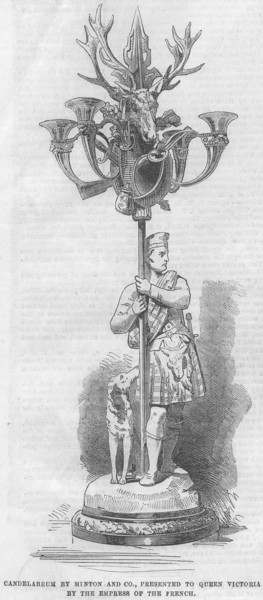Messrs. Minton and Co. are the most conspicous contributors of pottery in the Paris Exhibition. No single firm has contributed so many excellent samples of its manufactures. The collection, Englishmen will be happy to observe, includes some beautiful vases, drawn by students of the Schools of Design. Then there is the facsimile of the beautiful toilette service in blue and white parian, presented by Prince Albert to the Queen. The stand for scents is especially pretty in design; the various scents being marked by the groups of flowers from which they are extracted. The most complete specimen, however, of Messrs. Minton and Co.'s manufactures, is the great dessert service, in the centre of which are the two pretty candelabra, presented by the Emperor of the French to the Queen of England (which we have engraved). The collection of Palissy and Majolica ware, however, is that which appears to have created the greatest sensation among Parisian connoisseurs. The reader will remember that the main difference in these wares is that whereas the Palissy ware is coloured by a transparent glaze, Majolica ware contains the colour (opaque) in the material. The care and taste with which these manufactures have been brought by the Messrs. Minton to their present state of perfection, have been amply rewarded. Within a few days of the opening of the Exhibition all the specimens exhibited had been sold. One sample of Palissy ware—being a little tea-service spread upon a leaf, the legs of the teapot being snails, all exquisitely finished—was bought by Mr. Redgrave. In addition to these contributions, there are some fine statuettes and busts in parian, including one after the Count de Nieuwerkerke's bust of the Empress; a bust of the Emperor; a statuette of Lady Constance Grosvenor; and Cain and Abel, by A. Carrier (a French artist), which we have engraved.

Candelabrum by Minton and Co., Presented to Queen Victoria by the Empress of the French.